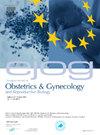妊娠期益生菌和B群链球菌定植:一项多中心、随机、安慰剂对照、双盲研究,重点关注阴道微生物瘤
IF 2.1
4区 医学
Q2 OBSTETRICS & GYNECOLOGY
European journal of obstetrics, gynecology, and reproductive biology
Pub Date : 2025-04-11
DOI:10.1016/j.ejogrb.2025.113976
引用次数: 0
摘要
目的探讨从妊娠晚期开始使用益生菌对低产科风险妇女直肠阴道B群链球菌(GBS)定植的可行性和效果。方法在意大利北部三所三级医院开展多中心、随机、安慰剂对照、双盲、平行组研究,纳入低危孕妇。干预包括从怀孕30周到怀孕37周口服两粒益生菌胶囊或安慰剂。主要结果是GBS定植,用直肠阴道拭子评估。在随机选择的一个亚组中,使用16S宏基因组测序库制备测序和分析评估治疗给药后阴道微生物组的变化。结果267名孕妇随机分为益生菌组(133例)和安慰剂组(134例)。两组在基线时相似。治疗后,直肠阴道拭子阳性率(p = 0.24)和抗生素给药率(p = 0.27)无差异。安慰剂组仅有1例产后发热(>38°C)。两组的分娩结局和新生儿结局相似。阴道菌群分析显示,益生菌对乳杆菌的相对丰度没有显著影响,但加德纳菌的相对丰度显著降低(3.6±7.9 vs 5.5±10.2;p = 0.03)。有趣的是,在随后出现部分膜破裂的女性中,乳酸杆菌的相对丰度显著降低(46.9±43.6 vs 77.7±24.9;p = 0.02)。结论虽然临床结果不受影响,但益生菌的使用导致了阴道微生物群的有利变化。这种效应如何转化为临床优势还有待确定。本文章由计算机程序翻译,如有差异,请以英文原文为准。
Probiotics in pregnancy and group B streptococcus colonization: A multicentric, randomized, placebo-controlled, double-blind study with a focus on vaginal microbioma
Objective
To evaluate the feasibility and effects of the use of probiotics in pregnancy, starting in the third trimester, on rectovaginal colonization of group B streptococcus (GBS) in women at low obstetric risk.
Methods
A multicentre, randomized, placebo-controlled, double-blind, parallel-group study was conducted in three tertiary hospitals in northern Italy and included low-risk pregnant women. The intervention consisted of oral administration of two capsules of probiotics or placebo from 30 weeks of pregnancy until 37 weeks of pregnancy. The primary outcome was GBS colonization, evaluated with rectovaginal swabs. In a subgroup, selected at random, changes in the vaginal microbiome after treatment administration were evaluated using 16S Metagenomic Sequencing Library Preparation sequencing and analysis.
Results
In total, 267 pregnant women were randomized to receive probiotics (n = 133) or placebo (n = 134). The two groups were similar at baseline. After treatment, no differences were found in the rates of positive rectovaginal swabs (p = 0.24) and antibiotic administration (p = 0.27). Only one case of postpartum fever (>38 °C) was found in the placebo group. Labour and delivery outcomes and neonatal outcomes were similar in both groups. Analysis of the vaginal microbiota showed that the relative abundance of Lactobacillus spp. was not modified significantly by the probiotics, but the relative abundance of Gardnerella spp. decreased significantly (3.6 ± 7.9 vs 5.5 ± 10.2; p = 0.03). Interestingly, the relative abundance of Lactobacillus spp. reduced significantly in women who subsequently presented with partial rupture of membranes (46.9 ± 43.6 vs 77.7 ± 24.9; p = 0.02).
Conclusion
Although the clinical outcomes were unaffected, administration of probiotics led to favourable changes in vaginal microbiota. It remains to be established how this effect could be translated into clinical advantage.
求助全文
通过发布文献求助,成功后即可免费获取论文全文。
去求助
来源期刊
CiteScore
4.60
自引率
3.80%
发文量
898
审稿时长
8.3 weeks
期刊介绍:
The European Journal of Obstetrics & Gynecology and Reproductive Biology is the leading general clinical journal covering the continent. It publishes peer reviewed original research articles, as well as a wide range of news, book reviews, biographical, historical and educational articles and a lively correspondence section. Fields covered include obstetrics, prenatal diagnosis, maternal-fetal medicine, perinatology, general gynecology, gynecologic oncology, uro-gynecology, reproductive medicine, infertility, reproductive endocrinology, sexual medicine and reproductive ethics. The European Journal of Obstetrics & Gynecology and Reproductive Biology provides a forum for scientific and clinical professional communication in obstetrics and gynecology throughout Europe and the world.

 求助内容:
求助内容: 应助结果提醒方式:
应助结果提醒方式:


